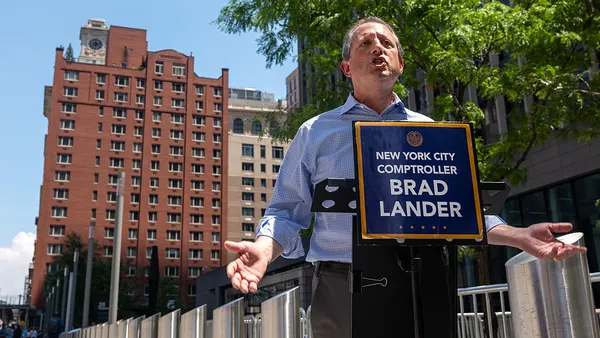New research from Unlocking America’s Future, a pro-ESG 501(c)4, revealed that Texas’ anti-ESG laws — which include bans on working with financial firms the state believes boycott guns or the oil and gas industry — have been both economically costly and unpopular with the state’s voters.
UAF released a research report and accompanying poll on Thursday, compiling the tolls the state’s laws have had on the business in the state, as well as on voter sentiment. The report said the state’s shift toward the far right — with other laws looking to chip away at abortion and reproductive rights and rights for the LGBTQ+ community — are leading the state to lose out on jobs and raising borrowing costs. UAF spokesperson Kyle Herrig told ESG Dive that the state’s lawmakers are hurting Texas’ reputation as being “good for business.”
“Banning financial institutions for engaging in responsible investing and enforcing fossil fuel mandates is burdening Texas taxpayers, costing jobs, and threatening the financial security of retirees,” Herrig said in an emailed statement to ESG Dive.
The pair of laws targeting financial firms — S.B. 13, targeting firms that boycott the oil and gas industry, and S.B. 19, targeting firms for their firearms stances — are estimated to have cost the state $700 million in lost economic activity and 3,000 lost full-time jobs, the Texas Association of Business reported in March. Texas could potentially pay an additional $22 billion in higher interest rates and fees due to the anti-ESG laws over the next 30 years, UAF noted in the release.
UAF’s poll of 1,114 registered Texas voters likely to vote this year — conducted by firm Z to A Research — found that more than half of respondents (56%) oppose the state’s bans of working with banks based on their fossil fuel or gun manufacturer investments. While 63% of respondents who self-identify as base Republicans supported the bans, a majority of self-identifying Democrats (81%), Independents (61%) and ticket-splitters (65%) oppose the bans.
More than half of Republican respondents said Republicans in the Texas state legislature are working for their wealthy campaign donors (62%) and too focused on “culture war issues” (52%). Given that the laws are costing the state’s constituents money, “it is not surprising that citizens oppose these and see them as ideological,” Victor Flatt, Case Western Reserve University’s environmental law chair, told ESG Dive.
Meanwhile, voters generally agree with the rationale of taking ESG investing principles into account and disagree that it is the state’s role to tell private corporations how to invest. Eighty-two percent of respondents agree that a company’s record on environment, workers’ rights and other social issues is a financial risk, including 71% of base Republicans; while 83% of respondents say it is not Texas’ role to tell private institutions how to invest, including 80% of Republican respondents.
“This new poll should be a wake up call for Governor Greg Abbott, and should serve as a warning for states like Oklahoma and Tennessee that are following in Texas' footsteps,” Herrig told ESG Dive.
The report and poll are part of a targeted UAF campaign that started earlier this month and also includes a six-figure digital ad buy and a site launch highlighting Texas’ rightward drift towards more extremist policies.
Flatt said part of the anti-ESG movement in Texas is “most definitely related” to oil and gas’ importance to the state economy, but the anti-ESG laws “probably do not directly support these businesses’ economic growth in the state.” Because of that, he said the laws make more sense when viewed as “tribal political signals” to indicate an “anti-woke” mentality.
“The real question is whether the need to appear ‘anti-woke’ (for future elections, get contributions, or appease Donald Trump) is worth the cost this is imposing on the state of Texas and its citizens,” Flatt said.










